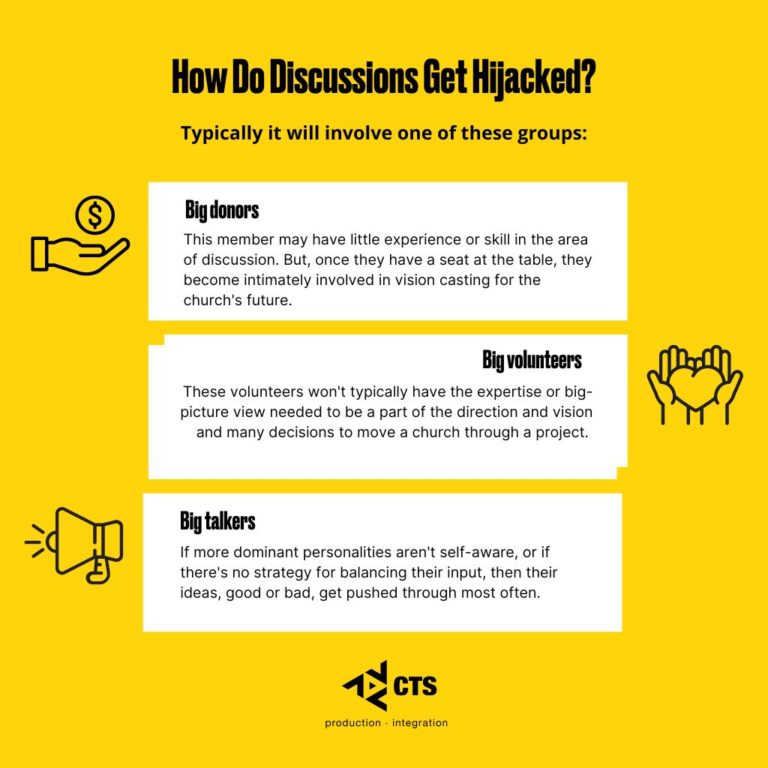Melt the Sacred Cows: How to Balance Vision, Expertise, and Strong Individual Opinions in Church Leadership Teams
Published on: Tuesday, August 23, 2022 - 7:00am

Have you ever led a team discussing a major initiative, only to find the project hijacked and headed in an unintended direction halfway through?
Most people in church leadership have been through something like this, whether regarding new building construction, new missions projects, or any other financially weighty topic. We’ve seen it often as an AVL integration company.
Churches can struggle with keeping these types of teams on track and in the appropriate hands. Today, we’ll talk about why that is, how it affects your projects, and some concepts that can help you better manage these situations.
How Do Discussions Get Hijacked?
Discussions about major projects and allocations of funds can go off the rails when the people who should be casting vision lose their place in the driver’s seat. Sometimes this is easy to spot, but it can also be subtle. Typically, it will involve one (or more) of three types of people.
Big donors. Most churches have some members of greater means who contribute more than others. As a way of honoring them and trying to keep them connected to the initiative, churches might offer them a seat at the decision-making table. The trouble is, this member may have little experience, expertise, or skill in the area of discussion, and they may not have a clear understanding of what the church needs. But once they have a seat at the table, they become intimately involved in vision-casting for the church’s future, regardless of qualifications.
A further complication is that people tend to defer to big donors, even subconsciously. Donors may have prominent, commanding personalities, which can make confrontation difficult. Or, committee members may be afraid of offending the donor and losing their financial support. Consequently, major financial contributors can end up with a disproportionate amount of influence over decisions that should instead rest in the hands of church leadership and experts.
Big volunteers. Another group that sometimes gets a seat at the table is long-time or very active volunteers.
Understandably, leadership may want to honor these people in some tangible way, give these dedicated volunteers a further sense of ownership, or even provide them the opportunity to share input on a certain project. Like the big donors, however, these volunteers may not have the expertise or big-picture view needed to be a part of the direction, vision, and decision-making process necessary to move a church through a project.
Big talkers. Everyone is different, and some people have stronger personalities than others. A more confident, more outspoken, or stronger-willed team member can exert a disproportionate amount of influence on discussions.
If more dominant personalities aren’t self-aware, or if there’s no strategy for balancing their input, then their ideas, good or bad, may get pushed through more often than they should. They’re simply heard more, and others with a differing view are nervous to speak. But the loudest opinion isn’t always the right one, and projects can suffer when stronger personalities aren’t managed well.

The Church Doing Business
A normal corporation or business has to run its operation professionally, with layers of management and oversight. The business places people on boards and committees because of real expertise and relevant experience.
Churches, though, often are not run like normal businesses. Or rather, they’re in the business of caring for people and their spiritual health and growth. As such, churches foster inclusion and avoid offenses and hurt feelings. While this is commendable in many situations, it can backfire when the church has to make tough business decisions and lead through complicated situations.
Too many times, we have seen a pastoral or shepherding mentality lead to difficulty in honest communications. This could manifest in an unwillingness or hesitancy to disagree with one another or express real opinions. Or, in a room with donors, volunteers, and loyal members who’ve “earned” a spot at the table, church leadership may struggle to keep to the mission and vision of the church.
What Does This Issue Affect?
In short, this problem can affect everything. Committee members with undue influence can override expert advice and even the original vision for a project.
It can lead to brand new buildings with immediate and pervasive issues, like structural columns that obstruct the congregants’ views of the stage. In this hypothetical scenario, someone with disproportionate influence may have pushed for these structural columns because they were cheaper, or to simply maintain control over the situation. As a consequence of disregarding expert design advice, the committee may have directly caused a lasting, impactful issue simply because members wanted to cater to certain leaders in the group.
It can lead to lopsided quality, functionality, and flexibility in technology systems. Maybe someone at the table cares most about sound and advocates for most of the AVL budget to be allocated to that system. You could end up with the Ferrari of sound systems and the Gremlin of lighting and video, when pursuing a more balanced solution recommended by AVL experts would better serve the church in the long run.
Tips for Managing an Effective Project Team
Say “thank you” elsewhere. It’s important to recognize that vision-casting and decision-making meetings are not the place to thank people for their service or support. In many cases, it can lead to a much more challenging project during which you battle the very person you intended to show gratitude.
Choose team members with the right expertise. Keep your stakeholder teams to experts, leadership, and staff members who are going to be responsible for the decisions made. Also, you should get input from the people who will work in those spaces or with those systems after the project is complete.
Choose team members who function well together. Most projects take a long time and involve a significant amount of stress and complication. Team members need to be able to respect each other and their differences of opinion and work together to find a common solution.
Be willing to make decisions. I won’t say that ruling with an iron first is the best way to lead a church, but senior leadership must be prepared to lead teams consistently, respectfully, and confidently. Disagreements will happen – so be prepared to manage them. In order to move a project forward in the best manner, there will almost certainly come a point when senior leadership needs to step in and say, “We’ve heard everyone’s thoughts, and here’s what we’re going to do.”
It’s not an easy job, but it’s an important one.
Conclusion
If you’re considering a church project based on thoughtful consideration, don’t let an unbalanced or unmanaged team hijack the discussion. Ensure church committees are full of real expertise, merit, and vision — not so everyone immediately agrees, but so you get the best input to take your church forward in the best, most effective direction.



